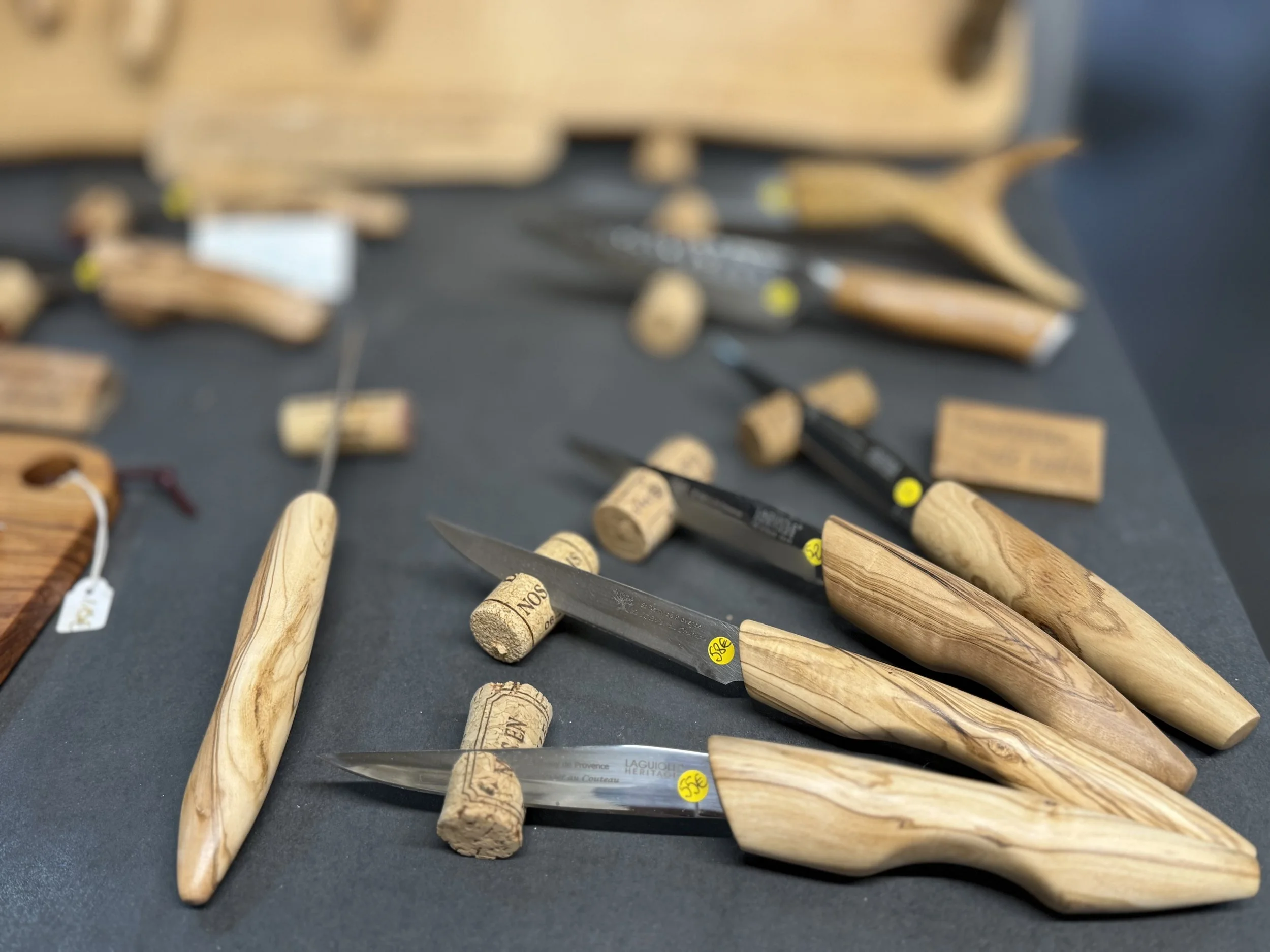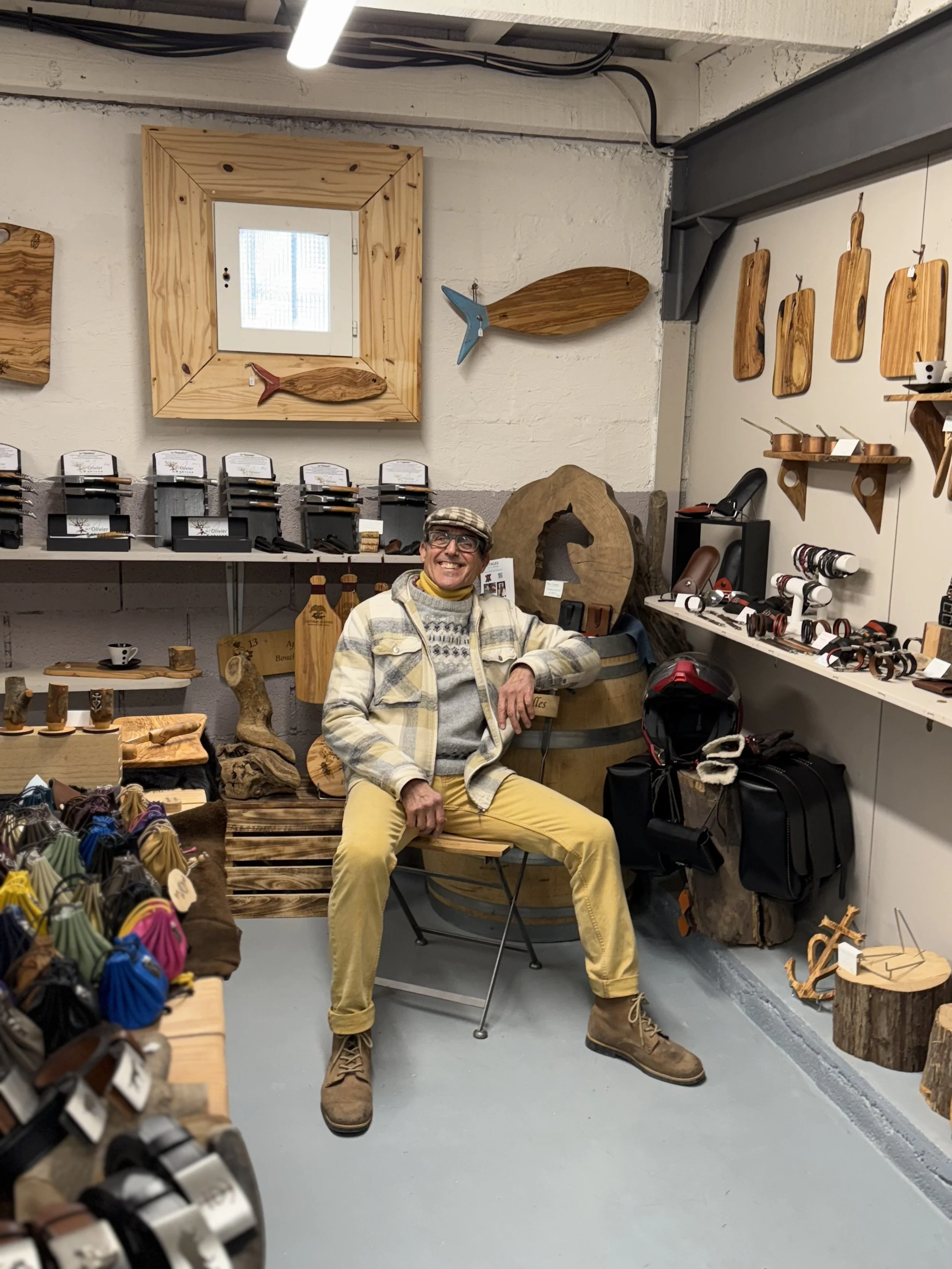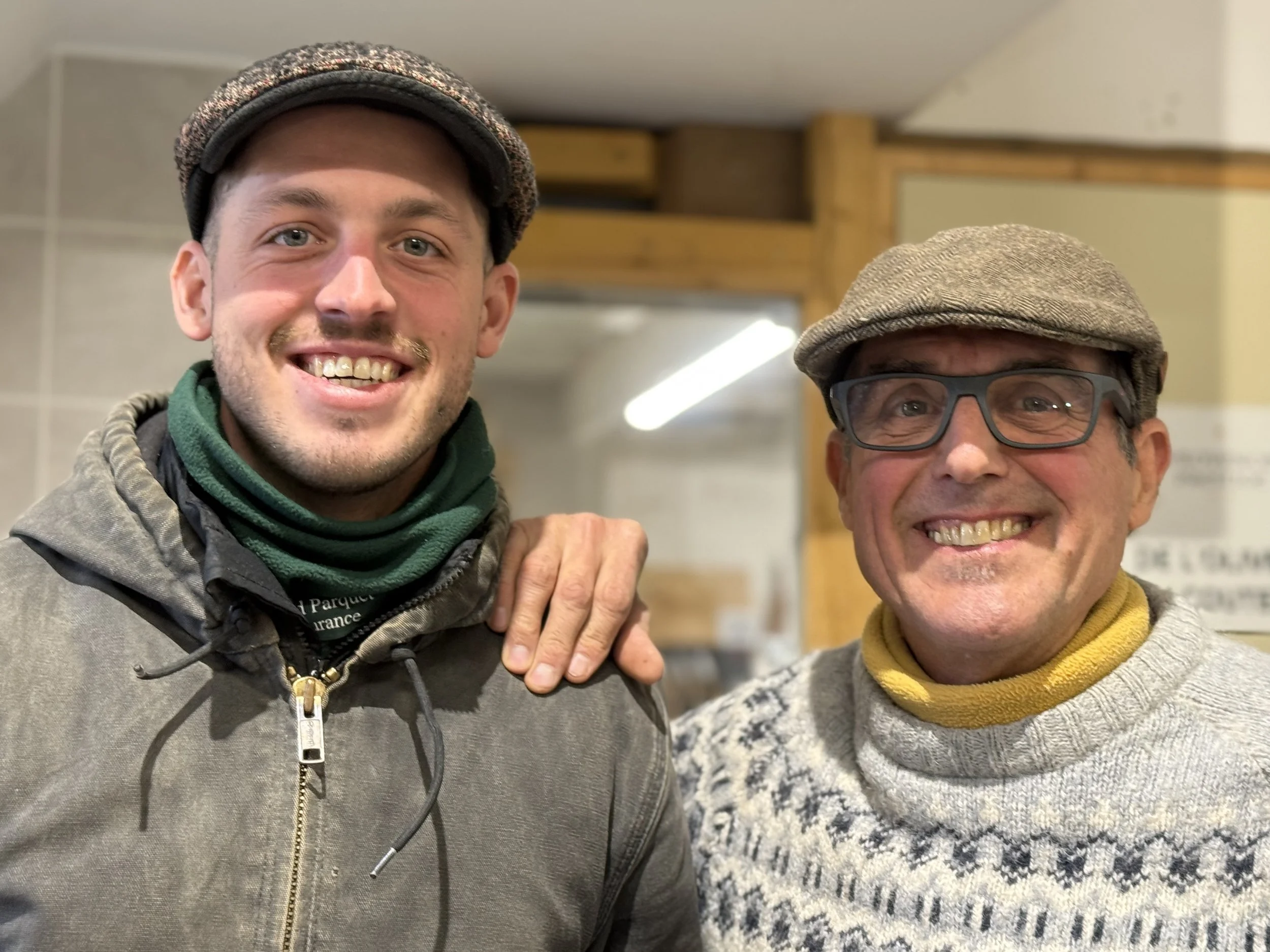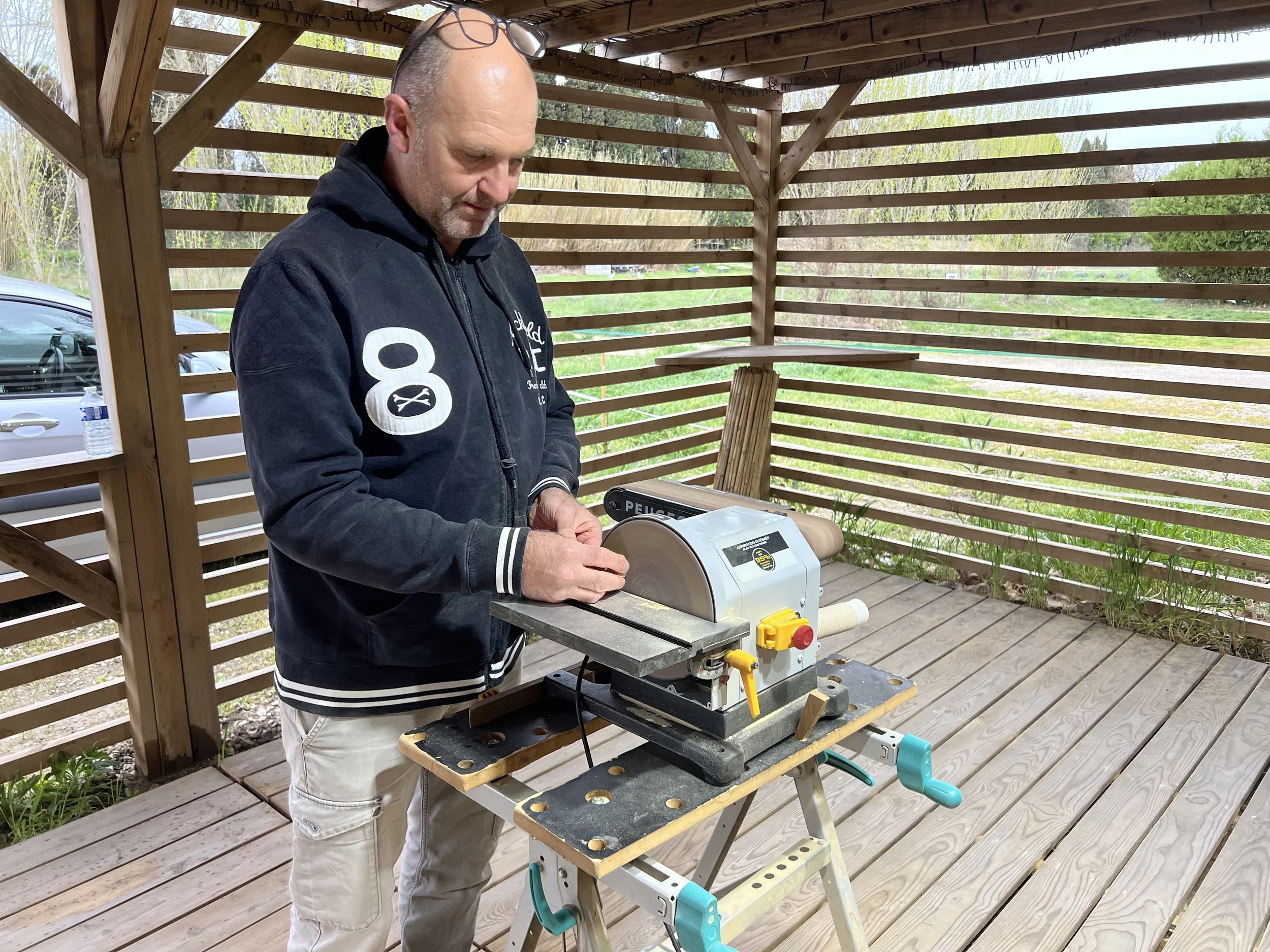One artisan’s passion for olive trees and the knives he carves out of them
Provence artisan Dominique Rousseau’s passion for making knives out of olive wood is only surpassed by his passion for teaching others how to make them, too.
Dominique Rousseau may have been born and raised in Paris, where he studied fine arts, but his heart has always been in the country and crafting knives out of rough wood, not painting on canvases.
“I lived many, many years in Paris, but I never really enjoyed being there,” says Rousseau. “I love nature. I love the country. And I always wanted to move from Paris. But I had my business there and it worked. So I stayed in Paris for that.”
What finally got Rousseau out of Paris was Provence. While on a trip to Australia thirty years ago, he met a French couple who lived in a village near the St. Rémy de Provence. St. Rémy, as the locals call it, is the capital of the Alpilles, a small range of low mountains in western Provence with natural landscapes so stunning that Van Gogh painted them. The couple raved about St. Rémy and the Alpilles and told him he should check it out. So when he returned home to France he did. And he never left.
Rousseau found much to love about this corner of Provence that is less known to tourists and even the French. He loved it’s breathtaking beauty, sunny climate, natural surroundings and traditions. But perhaps most of all he loved its Provencal symbol, the olive tree.
St. Rémy is the capital of the Alpilles, and the Alpilles is the land of the olive tree. The region is surrounded by some 350,000 olive trees and boasts a dozen olive oil mills, which produce some of the finest olive oils in all of Europe.
But it wasn’t the olive oil that Rousseau loved so much about the olive tree, it was its wood.
“I can’t imagine working with any wood than olive wood,” he said recently from his olive woodworking atelier and boutique on the outskirts of St. Rémy.
What’s so special about olive wood? Lots of things. First, it has a beautiful and distinctive grain. And because the olive tree is very slow growing, the wood is hard and dense, which makes it very durable and well suited for kitchen utensils and furniture. Olive wood is also resistant to doors and stains.
//break//
After Rousseau moved to St. Rémy, he met Sophie Textier, who he refers to as “ma chèrie,” and they started an advertising business together. One day, a customer asked Rousseau to create a digital drawing for his business. The man was a craftsman who worked with metal. Meeting the man (who later became Rousseau’s friend) reignited Rousseau’s old passion.
“I thought, I want to do things like he’s doing with my hands,” recalls Rousseau. “I want to make things.”
This time, however, Rousseau wanted to work with wood, not leather. And he wanted especially wanted to make kitchen knives out of olive wood. He’d had idea of doing that when he was a boy. One day, his grandmother’s kitchen knife broke and Rousseau repaired it for her. “That stayed in my head,” he remembers. “After I fixed her broken knife handle, I thought, when I’m older, I’m going to make knife handles.”
It took a few years for Rousseau and Texier’s business to get to a point where Rousseau could leave it to Texier to run and just focus on making knives. But in 2016, he made the leap, and he’s never looked back.
Today, Rousseau’s olive wood knives are so popular he can’t keep up with the demand. His customers even include establishments like the Michelin star restaurant, L’Auberge de Saint Rémy de Provence. These days he also crafts many other types of products out of olive wood than just knives: everything from cutting boards to key rings.
And in addition to making all these things, he also hosts workshops at his atelier every week, sometimes as many as two or even three a week. “Half of the people who come are local and half are tourists,” he says. At his workshops, people can make their own kitchen knives, cutting boards, or other kitchen utensils.
Lucky for Rousseau, in October 2023, one of he and Texier’s sons, Louis, came back home to work with him. “I was working in the wine industry as a sales rep and was tired of the corporate pressure,” says Louis. “I was ready for a complete change.” Like his father, Louis also wanted to work with his hands.
Besides their father-son relationship, the two also have a master-student relationship. Rousseau estimates it will take his son five years to become the master craftsman that he is. That’s not a problem for Louis, who started out making cutting boards but has recently started making knives.
“Papa’s patient with me,” he says. “And doing this kind of work, I never feel like I’m working.”
If it took Louis a year and a half to get to the level of expertise to be able to make knives, how is it that people can sign up for one of Rousseau’s workshops and make one in four hours?
“They leave thinking they’ve made the knives all by themselves, but the fact is, I do a lot of the work for them beforehand, like making the insertion for the knife blade,” says Rousseau. He also performs the delicate finishing touches on workshop attendee’s knives that requires so much skill that even Louis still hasn’t mastered the technique.
But don’t tell that to those who attend Rousseau’s workshop, including yours truly. I recently signed up for one to make a cheese knife. I was with three other men, none of whom, like me, had ever made a knife before. Two of the three men had been given the workshop as gifts.
After we each selected our own piece of wood (which Rousseau had pre-cut for us), we worked on our wood handles all afternoon. And at the end of the day, with Rousseau and his son’s help and guidance, we all four produced knives worthy of being sold in Rousseau’s boutique (which is his goal at his workshops). We proudly showed them off for everyone’s cell phone cameras and celebrated with a round of beer and French doughnuts.
None of us who attended Rousseau’s workshop would claim to be artisans like him, but the fun we all had was that for an afternoon, he let us pretend we could be.
You can buy kitchen knives in Rousseau’s boutique, or make them yourself in his workshops.
Rousseau in his boutique, which he has a hard time keeping stocked these days due to customer demand.
Louis Rousseau joined his father’s business in October 2023.
Stephane Valentin, a teacher, says his students gave him the knife making workshop as a gift.




